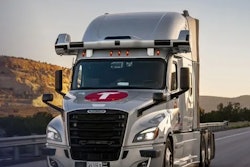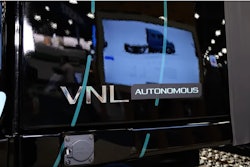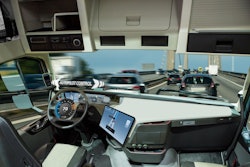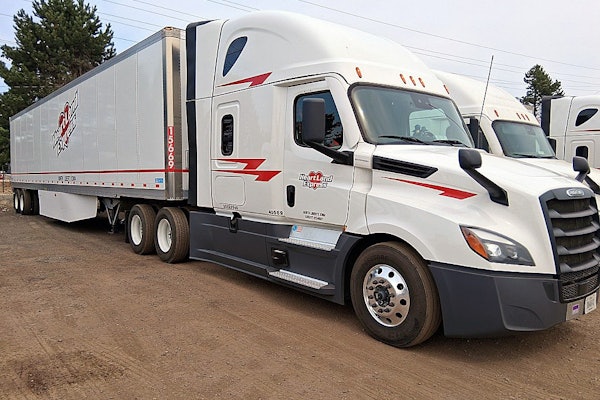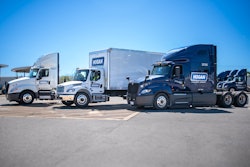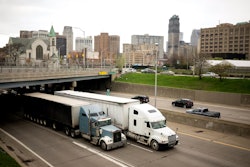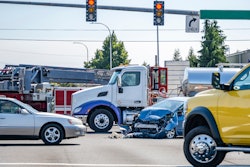Autonomous trucks have been in development for a number of years, and some are already on the nation’s interstates today running routes with drivers in the cab.
As that technology continues to evolve, there is concern among truck drivers that their jobs could be on the chopping block at some point. Even if that concern is warranted, seeing it come to fruition is still a ways off.
To understand where autonomous trucks are going, it’s important to know where they are today. Joining Jason and Matt on the 10-44 this week to talk about autonomous truck tech is Torc Robotics’ Frank Mabry.
Contents of this video
00:00 Autonomous trucks
01:48 Autonomous vehicle regulations
03:52 Public fear of autonomous trucks
05:22 Workforce concerns
07:07 Truly driverless trucks
10:53 Drivers and long-haul work
12:17 When are autonomous trucks expected to be commercially available?
Jason Cannon:
CCJs 10 44 is brought to you by Chevron Delo, heavy duty diesel engine oil. Now there's even more reasons to choose Delo,
Matt Cole:
How autonomous truck technology will impact the trucking workforce as the tech advances.
Jason Cannon:
You're watching CCJs 10 44, a weekly episode that brings you the latest trucking industry news and updates from the editors of CCJ. Don't forget to subscribe and hit the bell for notifications so you'll never miss an installment of 10 44. Hey everybody, welcome back and welcome to the New year. I'm Jason Cannon and my co-host is Matt Cole. Autonomous trucks have been in development for a number of years and some are already on the nation's interstates today running routes with the drivers in the cab. As that technology continues to evolve, there is some concern among the nation's truck drivers that their jobs could be on the chopping block at some point,
Matt Cole:
Even if that concern is warranted. Seeing it come to fruition is still a ways off as we'll hear more on shortly. But to understand where autonomous trucks are going, it's important to know where they are today. Joining us to talk about autonomous truck tech is Torque Robotics. Frank Mabry.
Frank Mabry:
Right now it's progressing for us for torque. It means that we have just switched over from the r and d stages to the productization stages, and what that means is we're getting ready to go to market and be able to produce this and scale it on a large scale for us. For the end of this year, we've done our driver out qualification or certification. We're fine tuning, fine, honing the product, getting it ready, and I think you'll start seeing more activity. I mean, we're already testing all across the country in a lot of different environments. That's the main thing right now is make sure that it's a hundred percent, it's a hundred percent safe and it's ready for prime time.
Jason Cannon:
Autonomous vehicle regulations vary a lot state to state, but Frank says when torque launches its autonomous lane, it will be in Texas, a very autonomous friendly state for autonomous trucking to continue to grow. Frank believes a nationwide standard is needed.
Frank Mabry:
We're operating and we're planning on our first launch. Lane is going to be Dallas to Laredo. Texas is very friendly to autonomous operations. We work with all the local and state governments as well as the federal government to make sure that we're in compliance with what they need, how they need it. We let them know regularly what we're doing, how we're operating. For instance, we're working very closely with US Customs and Border Patrol to be able to navigate their checkpoint in North Laredo. So all those things are in play right now. If I had to venture out and say what has to happen for this to go nationwide is for all of the states to get together and decide what their qualifications are. I mean, there's a lot. Most of the states are open to it. There are a few that said, oh my God, I don't want it there, which I really don't understand. And then the federal government come in and say, okay, here are the overlay qualifications that we see that need to be done. And from what I understand, all of that's in process.
Matt Cole:
Frank acknowledges that there is a lot of public fear of the unknown when it comes to autonomous trucks. After a word from 10 44 sponsor, Chevron lubricants will hear his case for why there shouldn't be so much concern.
Speaker 4:
We serve customers from Birmingham, Alabama to the Gulf Coast, so our people and our trucks are booked solid all day. There is no slack in our schedules. These trucks can't break down. I choose an engine oil that takes care of the number one issue with our engines emissions, so we don't have to worry about DPF clotting. I choose the engine oil that keeps our trucks hauling. I choose delo 600 a DF.
Frank Mabry:
I get this question a lot. I get to travel and go to prospective customer locations and a lot of trade shows and symposiums and do things like this with you. And the first thing I say when people look at me and go, oh my God, I'm scared for those to be on the road. Think about it. You've got a driver, female, male, doesn't matter. They're in the truck and they've got their cell phone in front of 'em. They're fighting with their wife, their boyfriend, their husband, their dispatcher or whomever. They're thinking about, where's my next meal? Where am I going to take my break? Where am I going to get fuel? And they can only focus on what's in front of 'em. You have an autonomous truck that has a 360 degree field of view that looks at that every millisecond and is always cognizant of what's going on around it.
And anticipate to conceive farther than the human eye can distinguish what's going on farther and say, okay, I need to avoid this situation. So the ongoing theory is that it makes a decision before it gets into a bad situation. So why would you be scared of that? That's the way they're designed. They're not going to speed. They're not going to get mad, have road regs. They're not going to say that there's a truck in front of me going 64. I want to go 65, so I'm going to try to get around and I'm going to block all the lanes of traffic until I can get around it because my truck's governed at 65 too. So it alleviates all of that. And what I try to stress is look at this as another mode of transportation
Jason Cannon:
When it comes to workforce concerns. Frank says, there will still be plenty of opportunities in this industry, whether that's driving or in some other aspect of the business.
Frank Mabry:
Everybody thinks, oh my God, you're taking my job. But what I always tell everybody, you're a young person, they're changing the ages now. So I'll just say 21 to 24 years old, you want to be a truck driver, you want to make a career out of it, do it. There's always going to be a need for a human driver. Even with autonomous trucks, that's what we're going to do. It is going to open up and I've had stockbrokers, I've had airline pilots, retired airline pilots, police officers, firemen, all kinds of different professional people that decide for whatever reason they want to get out of what they were doing and go into truck driving. Well, they get into truck driving. They either enjoy it or decide, well, I'm purpose driven. I want to do more. So what this is going to be able to do is, number one, these trucks are going to be the most inspected trucks on the road.
There's new jobs for truck inspections. An autonomous truck will be inspected before every lot. They'll be the most the best equipment on the road to hands down. So there'll be those opportunities. There'll still be dispatching planning opportunities, technical opportunities to work on the sensors, the calibration, more software opportunities to work on the software stacks, the hardware stacks. So it's going to open up a lot of different avenues for people, not just truck drivers, but for other people to get into. And that's the one thing that people, they kind of lose sight of. New technology comes in and makes their jobs easier and opens it up so they can do other things, maybe bigger and better things.
Matt Cole:
Autonomous truck technology today still requires an operator in the cab to oversee the operations are truly driverless trucks on the horizon.
Frank Mabry:
10 years ago, I'd have told you it's a pipe dream. Oh my god, it's not going to happen. There's too many variables. How do you do that today? I mean, I've been in the trucks. I've been with Torque for three years. I've been in the trucks repeatedly, and the technology is there. It's awesome. It has some progression to do to make all the safety cases and certification of the sensor, the lidar, the radar, all of that needs to be commercially certified, but it's going to happen. And the way that it's going to hit the market initially is hub to hub. And now I've been in the truck, it navigates surface streets just fine, but if you take a look at it, a lot of the surface streets were not made for the size of equipment that we have now, and it's a whole lot easier with the robotaxis to navigate surface streets than a car.
And what goes into it is a lot of mapping, a lot of getting ready to be able to navigate which lanes it's on. So hub to hub, which is mostly interstate four, lane six lane roads or more. That's going to be the first launch like our Dallas to Laredo. And that will start once we go commercial. And when I say commercial, that means we can actually, if a trucking company called and says, I want one or I want a thousand, they can order those and we can deliver 'em to them because our business model is not to run freight. Our business model is to sell those to trucking companies where their core competency is run freight. Our core competence is building the trucks. So that's where you'll see it start off first After those first lanes, whether it's us or our competitors, whomever, you'll start to see it get more and other lanes open up based on all types of different factors.
Company calls and said, I could use a thousand trucks on Atlanta to go Dallas to Atlanta. Well, that could be your second lane. Or Phoenix made the decision last year that their building an inbound port in Phoenix because of all the regulations and everything California's doing. If you can't have a diesel truck in California, you'll have to take it to Phoenix before it can go to the rest of the world, rest of the country. So it's going to evolve just like that and get bigger and bigger, but there's always going to be, at least in our foreseeable future, a driver in the seat doing the first mile and the final mile. It gets pretty chaotic at a lot of these shipper locations and manufacturing locations, even distribution centers. I did the logistics for Coca-Cola when I was with US Express and huge yard, huge facility, but there's tremendous amounts of, I mean, I had 150 trailers on the yard just for my company, and Coke had theirs, their trucks.
So it gets pretty chaotic. It's not as cut and dried as you hit the gate and you back to the dock, right? Then trucks come in, they've got to wait. So that stuff will get better and better, and it's going to cause a lot of these shippers and manufacturers and trucking companies to really plan and go, okay, it'll cut out some of the inefficiencies instead of my truck going from Dallas to Laredo and then somewhere else, anywhere in the United States, you plan, so that truck goes from Dallas to Laredo, you reload it and it goes right back to Dallas. And as the lanes start expanding, you can optimize that and go to different places, but it'll still be very controlled and you'll have to go in and plan. It won't be going on a load board and say, oh, I need to move this truck period. I'll just pick a load. That means it's going to help them be more profitable, less empty miles, less fuel usage. So that's kind of how I see it materializing.
Jason Cannon:
Now, as Frank mentioned, even with driverless trucks, drivers will still likely be needed for the first and final mile. So what does that mean for drivers who would enjoy doing long haul work?
Frank Mabry:
The industry has been changing with the driver shortage, and it's hard being a truck driver. Most people want to be at home with their families at least a lot more regularly. They don't want to leave on a Sunday night and get home three weeks later or three months later, things like that. Some guys like that, especially the single guys. There's still going to be opportunities for that to take place because also we're only going to be hauling at least to start out with, and regulations would have to change drastically for this to change. But drive Van Freight, refrigerated freight, when you start getting into flatbed and hazmat and all that, there's a lot more qualifications and they have to stop every two hours and physically inspect and a lot of regulations that it doesn't make sense for an autonomous vehicle. Those opportunities will still be out there. But what it does is, I said the industry started changing about 10 years ago, maybe a little more, when they said, okay, this is part of the problem. So a lot of the trucking companies went to a hub and spoke variations so that the drivers can be domiciled in a particular area, go out, come back, go out and come back and be home with their families a lot more often and makes it a lot easier on them.
Matt Cole:
So, when are autonomous truck expected to be commercially available?
Frank Mabry:
I can't speak for our competitors, of course, they've got their own timelines, but for us, 2027, that should all of the sensors and everything are commercially certified. And what that means is for a personal vehicle, all the sensors and everything that's on the car or truck is certified for a hundred thousand miles. For a commercial vehicle, it's a million miles. So all of that'll be done, and if you were to walk in and say, okay, I want to order these, then Freightliner is positioned so they can scale and they can produce those when the customer needs. So if you want one, you want 500, you want a thousand, you want 10,000, they'll be able to commercially produce those. So that's kind of where we are in that timeline. 27, I think some of our competitors kind of said the same thing for commercially being able to produce 'em like that. Probably the same timeframe.
Jason Cannon:
That's it for this week's 10 44. You can read more on ccj digital.com. While you're there, sign up for our newsletter and stay up to date on the latest in trucking industry news and trends. If you have any questions or feedback, please let us know in the comments below. Don't forget to subscribe and hit the bell for notifications so you can catch us again next week.

